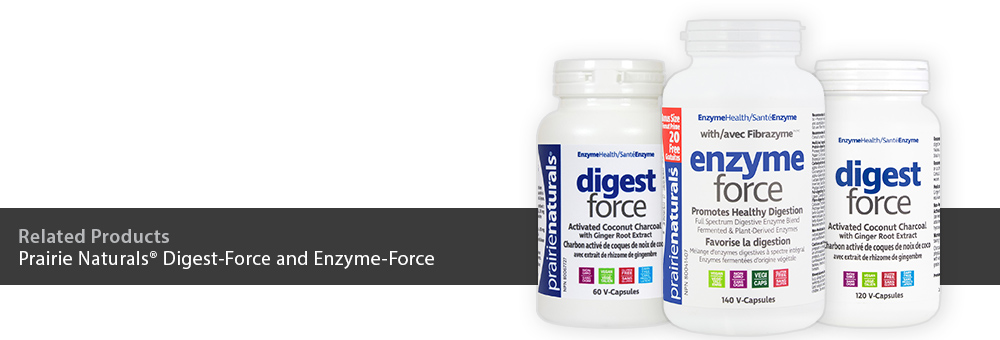

Need digestive help? Enzymes may be the answer!
Our digestive tract was not designed to handle the modern North American diet of cooked and processed food even if the food is organic and wholesome. Raw foods come with their own supply of enzymes, which are essential for digestion and for life itself. Most people eat cooked foods. We are getting too few enzymes in our over-cooked, pasteurized, irradiated, over-processed foods.
The Effects of an Enzyme Poor Diet
To compensate for these lost food enzymes, the body must work harder and create more digestive enzymes. Feeling sleepy after a meal occurs because the body is working more intensely than it should in order to complete the digestive process. Consequently, it doesn’t have adequate energy or nutrients to produce enzymes for other functions, such as, removing toxic cellular waste, protecting itself against foreign invaders (immune function), producing hormones, neurotransmitters and making new cells and tissues. Result – our health suffers and the body ages faster.
Signs of Enzymes Deficiency
Many people do not realize that feeling sleepy after a meal or not being able to eat dairy products, spicy foods or heavy foods in general, may be signs of enzyme deficiency. One of the first and most obvious signs is poor or disturbed digestion, including excess purifying gas, bloating, indigestion, heartburn, and constipation and/or diarrhea. As we age, the enzymes produced by our bodies decrease in number and in activity level. A lack of enzymes can contribute to an increase in pain, inflammation, and a lack of stamina as well as hindering the body’s ability to resist infection or to heal a wound.
What Are Enzymes?
Enzymes are large protein-based molecules that catalyze (i.e., increase the rates of) chemical reactions. Every action and reaction in your body is dependent on enzymes; all cells require enzymes to survive and function. With respect to digestion, enzymes play critical roles in breaking down proteins into amino acids, fats into fatty acids, complex carbohydrates into simple sugars and complex fibre into smaller fibre units, allowing for complete absorption of valuable nutrients. Digestive enzymes also remove toxins from the bowel, relieve constipation and help condition the line of the digestive tract.
How to Increase Enzyme Intake
We get enzymes externally from the food we eat (food enzymes) and internally from our digestive organs (digestive enzymes). But when food is cooked or processed at temperatures greater than 118°F, the enzymes in the food are destroyed. With aging, injuries, illnesses and stress, we need to eat more enzyme-rich foods and take enzymes – enzyme supplements for aiding digestion were actually first introduced as far back as the 1890’s
Taking a comprehensive digestive enzyme supplement will help the body break down proteins, fats, carbohydrates and fiber making it possible to benefit from the nutrients found in those foods.
What to Look for in a Good-Quality Digestive Enzyme?
Plant based enzymes are the most popular enzymes found in natural food supplements, their safety and efficacy have been well documented over many decades of use worldwide. Within the enzyme category, the top three are amylases (starch breakdown), proteases (protein breakdown), lipases (fat digestion), as well as cellulase, hemicellulase and phytase (fibre breakdown). Of all the choices, plant-based enzymes are the most active or potent. This means they contain the highest active units and can break down more fat, protein and carbohydrates in the broadest pH range than any other source. Be sure to find a patented, broad-spectrum, non-GMO enzyme that contains fibrazyme. Fibrazyme is a blend of fibre-digesting enzymes that maximizes fiber and cereal digestion along with the absorption of essential minerals. This blend is shown to be a necessary addition for proper nutrient absorption from high-fibre foods or for those taking mineral supplements with meals.
What to Expect when taking a Digestive Enzyme
Plant based enzymes are useful to develop and maintain a proper digestive system and can be taken with meals to aid in the digestion of all foods or between meals to feed and fortify the body as a whole. If you have problems with indigestion, gas, bloating, constipation or reflux, a digestive enzyme supplement can help. Digestive enzyme supplements help to break down foods more thoroughly, and fewer digestive complaints occur.
Given the relatively low cost per serving/dosage of these enzyme formulas compared to the reported benefit overall, consumers can choose to make enzyme supplementation a part of daily meal intake.

